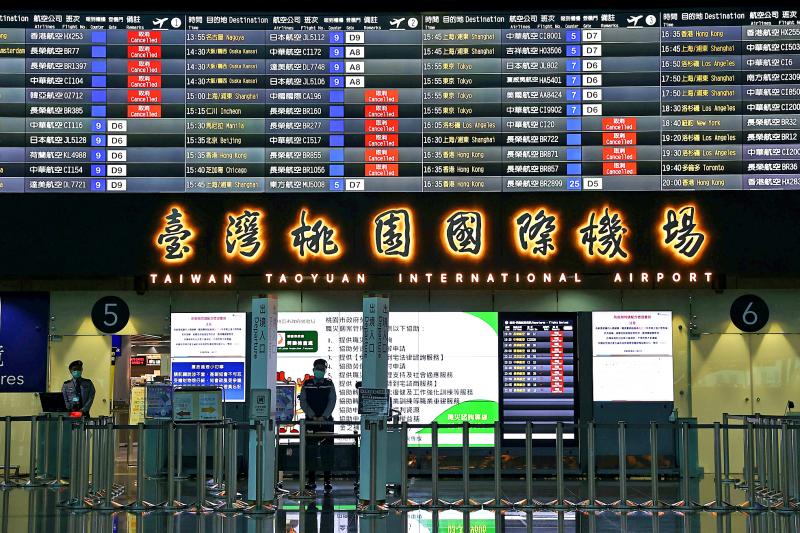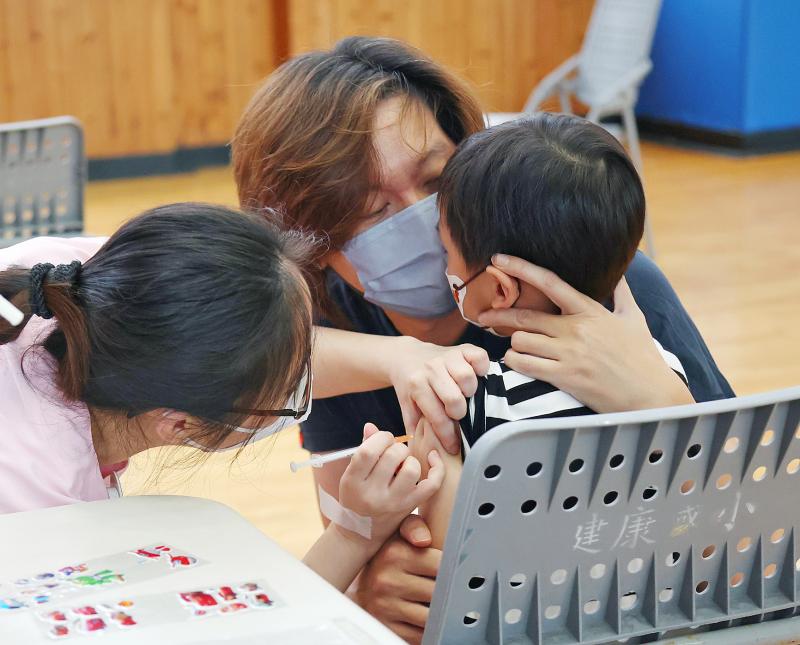The Central Epidemic Command Center (CECC) yesterday said a policy for reopening national borders to business travelers was being discussed with the Ministry of Economic Affairs and “would be announced soon.”
Minister of Health and Welfare Chen Shih-chung (陳時中), who heads the center, said that the COVID-19 infection rate in Taiwan has increased to about 6 percent, which is about the same as the positivity rate detected among inbound travelers.
The tight border control measures imposed since the COVID-19 pandemic began had aimed to keep the virus out, but as the infection rate has increased, stopping the virus at the border is no longer a main concern, he said.

Photo: Reuters
The main concern that would affect border reopening plans for next month would be healthcare capacity, as healthcare providers are still under pressure due to the local outbreak, he said.
However, for the first time since last month, the number of COVID-19 cases discharged from hospitals exceeded the number of COVID-19 cases admitted to hospitals on Friday, Chen said, adding that it is like “seeing the light at the end of the tunnel” regarding the reopening of national borders.
As many countries are reopening to restore economic stability, and Taiwan has lost out on many international investment and business opportunities during the pandemic, the policy for reopening to business travelers would be announced soon, he said.

Photo: CNA
Centers for Disease Control (CDC) Director-General Chou Jih-haw (周志浩), head of the CECC’s disease surveillance division, said 80,835 local cases, 46 imported cases and 127 deaths were confirmed yesterday.
Chen said 10,066 courses of the oral antiviral Paxlovid and 1,351 courses of molnupiravir were prescribed on Friday, a significant increase from previous days.
Based on Friday’s daily case count, approximately 14 percent of confirmed cases have received oral antiviral drugs, he said.
Addressing concerns that Taiwan does not have enough antivirals to treat people with COVID-19, Chen said 59,797 courses of Paxlovid have been prescribed, 657,393 have been stockpiled and 2,810 have yet to be delivered, while 14,611 courses of molnupiravir have been prescribed, 91,229 have been stockpiled and a new contract has been signed to procure 201,600 courses.
If about 15 percent of cases are eligible for antivirals, the procured drugs would cover another 5 million confirmed cases, he said.
CDC Deputy Director-General Philip Lo (羅一鈞), deputy head of the CECC’s medical response division, said that 4,439 moderate or severe cases, including 1,058 deaths, have been reported so far this year.
As of Friday, the rate of severe cases had increased to about 0.08 percent, he said.
Of the 127 deaths confirmed yesterday, 119 people had underlying health conditions, 48 were unvaccinated and 74 people did not receive a booster shot, the center’s data showed.
Two young children died, one of whom was a six-year-old boy who was originally suspected of having encephalitis, but was later found to have a malignant tumor in his cerebellum, Lo said, adding that he died of a brain tumor and neurogenic shock.
The other was a five-year-old boy who had a muscular disease and died of pneumonia and respiratory failure, he said.
Pediatric Infectious Diseases Society of Taiwan chairperson Chiu Nan-chang (邱南昌) said there could be four reasons COVID-19 affects the brain, the main one being a “cytokine storm” induced by the virus, which is a hyperactive immune response that can harm the nervous system and organ tissues.
While the reasons are being studied, the most important things people should look out for in children are early signs of severe illness and encephalitis, he said.
Although the rate of severe cases among children with COVID-19 is low, parents should try to keep their children safe and consider getting them vaccinated if they are five or older, because it is hard to predict how they will react to the disease, Chiu said.

CHAOS: Iranians took to the streets playing celebratory music after reports of Khamenei’s death on Saturday, while mourners also gathered in Tehran yesterday Iranian Supreme Leader Ayatollah Ali Khamenei was killed in a major attack on Iran launched by Israel and the US, throwing the future of the Islamic republic into doubt and raising the risk of regional instability. Iranian state television and the state-run IRNA news agency announced the 86-year-old’s death early yesterday. US President Donald Trump said it gave Iranians their “greatest chance” to “take back” their country. The announcements came after a joint US and Israeli aerial bombardment that targeted Iranian military and governmental sites. Trump said the “heavy and pinpoint bombing” would continue through the week or as long

TRUST: The KMT said it respected the US’ timing and considerations, and hoped it would continue to honor its commitments to helping Taiwan bolster its defenses and deterrence US President Donald Trump is delaying a multibillion-dollar arms sale to Taiwan to ensure his visit to Beijing is successful, a New York Times report said. The weapons sales package has stalled in the US Department of State, the report said, citing US officials it did not identify. The White House has told agencies not to push forward ahead of Trump’s meeting with Chinese President Xi Jinping (習近平), it said. The two last month held a phone call to discuss trade and geopolitical flashpoints ahead of the summit. Xi raised the Taiwan issue and urged the US to handle arms sales to

State-run CPC Corp, Taiwan (CPC, 台灣中油) yesterday said that it had confirmed on Saturday night with its liquefied natural gas (LNG) and crude oil suppliers that shipments are proceeding as scheduled and that domestic supplies remain unaffected. The CPC yesterday announced the gasoline and diesel prices will rise by NT$0.2 and NT$0.4 per liter, respectively, starting Monday, citing Middle East tensions and blizzards in the eastern United States. CPC also iterated it has been reducing the proportion of crude oil imports from the Middle East and diversifying its supply sources in the past few years in response to geopolitical risks, expanding

Pro-democracy media tycoon Jimmy Lai’s (黎智英) fraud conviction and prison sentence were yesterday overturned by a Hong Kong court, in a surprise legal decision that comes soon after Lai was jailed for 20 years on a separate national security charge. Judges Jeremy Poon (潘兆初), Anthea Pang (彭寶琴) and Derek Pang (彭偉昌) said in the judgement that they allowed the appeal from Lai, and another defendant in the case, to proceed, as a lower court judge had “erred.” “The Court of Appeal gave them leave to appeal against their conviction, allowed their appeals, quashed the convictions and set aside the sentences,” the judges